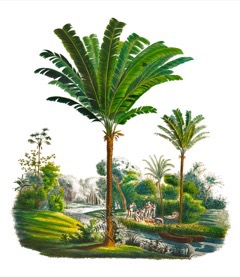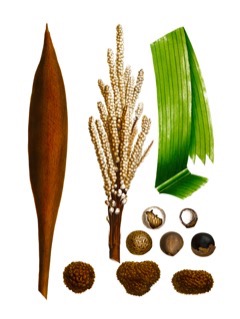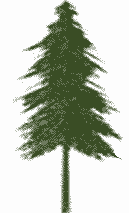 |
|
http://www.edibleplants.org |
 |
| http://www.edibleplants.org |
Translate this page:
Summary
Commonly found in South America, Manicaria saccifera or commonly known as Ubussu is an evergreen, large, single-stemmed palm of up to 10 m tall and 15 - 20 cm stem diameter. It is used medicinally to treat asthma, cough, thrush, and diarrhea. Young leaves are cooked as a vegetable but has to be boiled for 15 minutes to destroy harmful glucosides. The roots are cooked as well; it has high carbohydrate content. The juice of the young fruit is also edible. The seeds yield edible oil. The starchy stems are source of sago. Other uses of the leaves are for thatch and sails. Fibers obtained from the inflorescence are used to make caps, bags, and mats.
Physical Characteristics

 Manicaria saccifera is an evergreen Tree growing to 10 m (32ft) by 10 m (32ft) at a medium rate.
Manicaria saccifera is an evergreen Tree growing to 10 m (32ft) by 10 m (32ft) at a medium rate.
See above for USDA hardiness. It is hardy to UK zone 10.
Suitable for: light (sandy), medium (loamy) and heavy (clay) soils. Suitable pH: mildly acid and neutral soils. It can grow in semi-shade (light woodland) or no shade. It prefers moist or wet soil.
UK Hardiness Map
US Hardiness Map
Synonyms
Manicaria atricha Burret Manicaria martiana Burret Manicaria plukenetii Griseb. & H.Wendl. Pilophora
Plant Habitats
Edible Uses
Edible Parts:
Edible Uses: Drink
An edible oil is obtained from the seeds[317 ]. The liquid endosperm of unripe fruits is drunk[317 , 768 ]. The fruit is 4 - 6cm in diameter[412 ]. Sago is obtained from the starchy stems[317 , 768 ].
References More on Edible Uses
Medicinal Uses
Plants For A Future can not take any responsibility for any adverse effects from the use of plants. Always seek advice from a professional before using a plant medicinally.
Antiasthmatic Antidiarrhoeal Antitussive Diuretic
Several parts of the palm, including the apical bud, serve medicinal purposes[317 , 763 ]. A decoction of the root, combined with bamboo leaves and a decoction of Euterpe precatoria roots, is used to treat asthma and coughs[348 ]. The liquid from immature, green fruits is employed as a diuretic, and remedy for coughs, asthma and thrush[348 ]. It is also used to treat diarrhoea[348 ].
References More on Medicinal Uses
The Bookshop: Edible Plant Books
Our Latest books on Perennial Plants For Food Forests and Permaculture Gardens in paperback or digital formats.

Edible Tropical Plants
Food Forest Plants for Hotter Conditions: 250+ Plants For Tropical Food Forests & Permaculture Gardens.
More

Edible Temperate Plants
Plants for Your Food Forest: 500 Plants for Temperate Food Forests & Permaculture Gardens.
More

More Books
PFAF have eight books available in paperback and digital formats. Browse the shop for more information.
Shop Now
Other Uses
Containers Fibre Thatching
Other Uses The leaves are utilized as thatch and sails[317 ]. This species produces the largest entire leaves of any known palm, and for this reason, as well as on account of their firm and rigid texture, they form the very best and most durable thatch[314 , 768 ]. The leaves are split down the midrib and the halves laid obliquely on the rafters, so that the furrows formed by the veins lie in a nearly vertical direction and serve as so many little gutters to carry off the water more rapidly[314 ]. A well-made thatch will last ten or twelve years, and an indigenous person will often take a week's voyage in order to get a canoe-load of the leaves to cover his house[314 ]. The fibres, obtained from the peduncular bracts of the inflorescences, are used for making caps, bags and mats[46 , 317 , 786 ].
Special Uses
References More on Other Uses
Cultivation details
A plant of the lowland, moist tropics. It cannot tolerate any frost[314 ]. Spacing: 8-10 ft. (2.4-3 m) 10-12 ft. (3-3.6 m).
References Carbon Farming Information and Carbon Sequestration Information
Temperature Converter
Type a value in the Celsius field to convert the value to Fahrenheit:
Fahrenheit:
The PFAF Bookshop
Plants For A Future have a number of books available in paperback and digital form. Book titles include Edible Plants, Edible Perennials, Edible Trees,Edible Shrubs, Woodland Gardening, and Temperate Food Forest Plants. Our new book is Food Forest Plants For Hotter Conditions (Tropical and Sub-Tropical).
Shop Now
Plant Propagation
Seed -
Other Names
If available other names are mentioned here
Ubussu, Troolie Palm, Busso, Sleeve palm, Temiche palm, Jiquera, Ubi, Palmier toulouri, Yolillo, Troolie, Escomfra, Guagara, Truli, Temiche, Manaco, Silico,
Native Range
SOUTHERN AMERICA: Trinidad and Tobago (Trinidad), Belize, Costa Rica, Guatemala, Honduras, Nicaragua, Panama, French Guiana, Guyana, Suriname, Venezuela (Amazonas, Monagas, Sucre, Delta Amacuro), Brazil (Amazonas, Pará), Colombia (Valle del Cauca, Chocó, Amazonas, Vaupés, Vichada), Ecuador (Esmeraldas), Peru (Loreto)
Weed Potential
Right plant wrong place. We are currently updating this section.
Please note that a plant may be invasive in one area but may not in your area so it's worth checking.
Conservation Status
IUCN Red List of Threatened Plants Status : This taxon has not yet been assessed

Growth: S = slow M = medium F = fast. Soil: L = light (sandy) M = medium H = heavy (clay). pH: A = acid N = neutral B = basic (alkaline). Shade: F = full shade S = semi-shade N = no shade. Moisture: D = dry M = Moist We = wet Wa = water.
Now available:
Food Forest Plants for Mediterranean Conditions
350+ Perennial Plants For Mediterranean and Drier Food Forests and Permaculture Gardens.
[Paperback and eBook]
This is the third in Plants For A Future's series of plant guides for food forests tailored to
specific climate zones. Following volumes on temperate and tropical ecosystems, this book focuses
on species suited to Mediterranean conditions—regions with hot, dry summers and cool, wet winters,
often facing the added challenge of climate change.
Read More
Expert comment
Author
Gaertn.
Botanical References
Links / References
For a list of references used on this page please go here
A special thanks to Ken Fern for some of the information used on this page.
Readers comment
| Add a comment |
|
If you have important information about this plant that may help other users please add a comment or link below. Only comments or links that are felt to be directly relevant to a plant will be included. If you think a comment/link or information contained on this page is inaccurate or misleading we would welcome your feedback at [email protected]. If you have questions about a plant please use the Forum on this website as we do not have the resources to answer questions ourselves.
* Please note: the comments by website users are not necessarily those held by PFAF and may give misleading or inaccurate information.
To leave a comment please Register or login here All comments need to be approved so will not appear immediately.
|
Subject : Manicaria saccifera
|
|
|
|